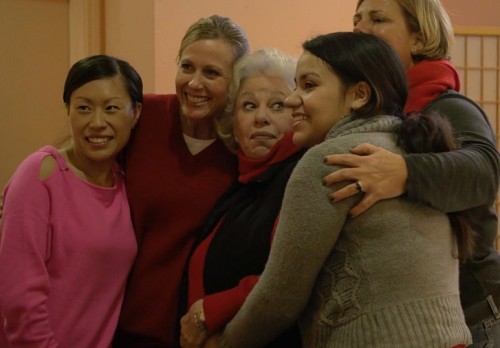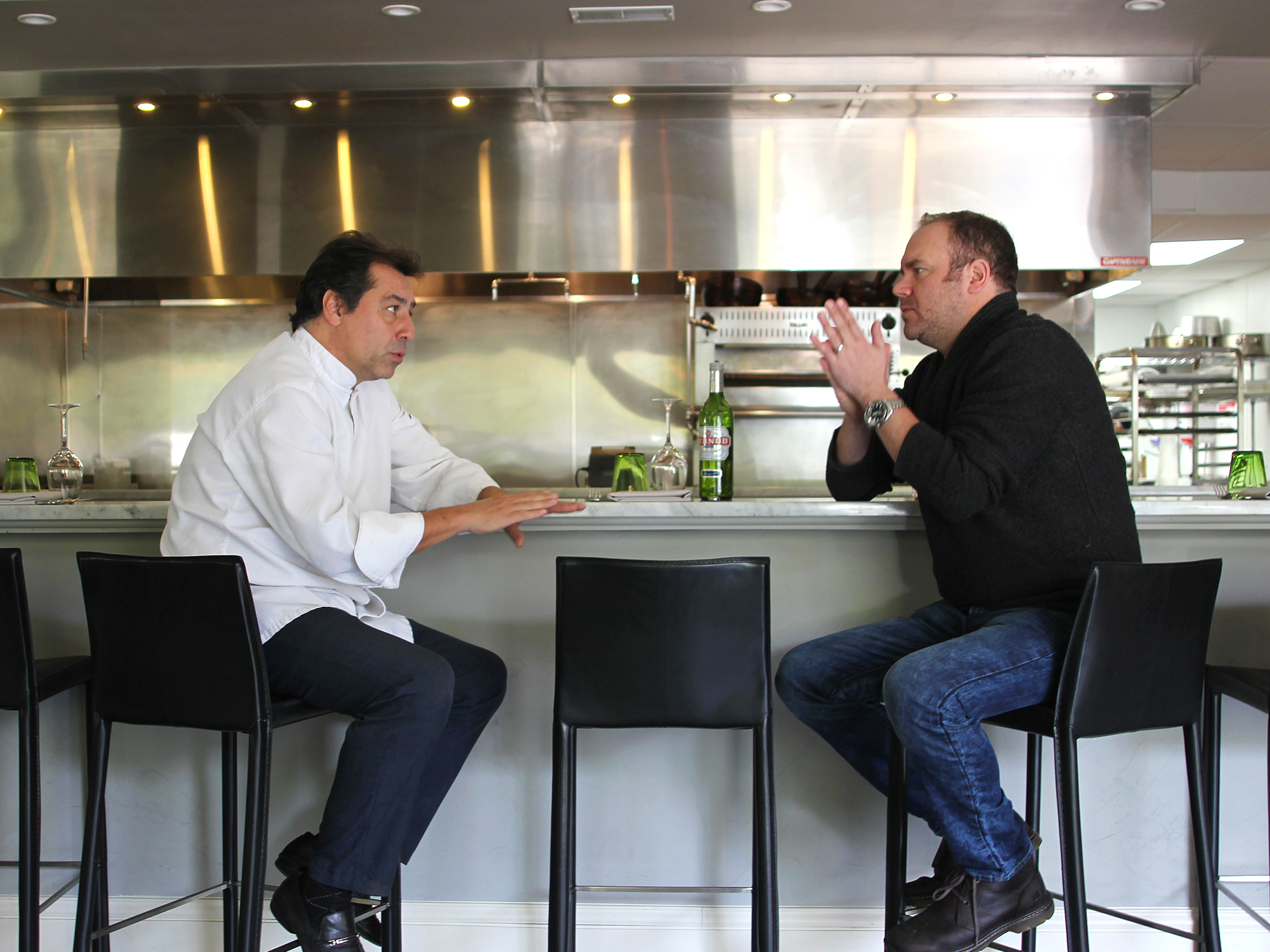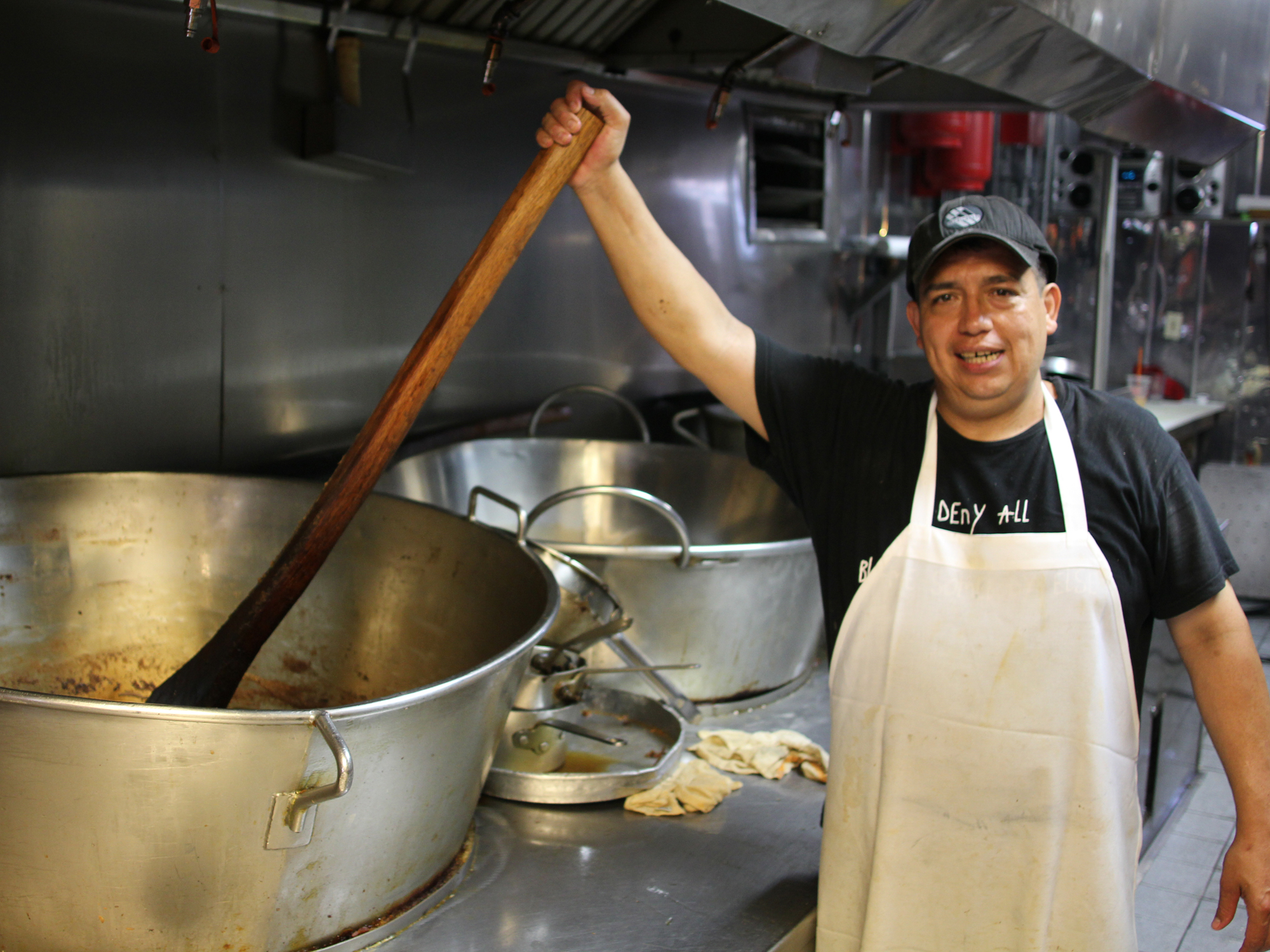THIS YEAR’S CHICAGO INTERNATIONAL FILM FESTIVAL highlighted films about two local chef-restaurateurs. But Ina Pinkney and Curtis Duffy have lived very different lives in and out of the kitchen.
In Breakfast at Ina’s we get an intimate look at the last thirty days of Ina Pinkney’s restaurant career. The movie opens with her getting dressed in the early morning, putting on her face and securing the leg brace which she has worn her whole life. Her life can be marked by the challenges she’s faced. As a young girl, she contracted polio. The polio not only affected her physically but emotionally, especially the relationship with her mother. The strength she found from her lifelong illness has served her well. She was forced to grow up young because she couldn’t run and play with the other children and sat amongst the adults.
Ina married the love of her life, Bill Pinkney, in 1965. Their interracial marriage was illegal in many U.S. states at the time and caused her to miss anniversaries when Bill was working in the South. Their marriage was never about color; Ina describes it vividly as love at first site. It laid the foundation for one of her best quotes, “It takes more energy to be afraid than courageous.” It was while she was with Bill that she opened her bakery and first restaurant. She’s modern by today’s standards, even though she is retired; Ina was an entrepreneur when a woman being a business owner wasn’t something that was done.
 Breakfast at Ina's
Breakfast at Ina's Anyone who dined at Ina’s will tell you it felt like dining at home. She was focused on service and making her guests priority one, even if they were a little crazy. Ina retired and ended the restaurant chapter in her life on her terms. It’s the way she’s always lived her life. Her sharp wit and keen observations have come from a life of experience. The sweet, older Grandma you see belies the quality Churchill described best, “Tact is the ability to tell someone to go to hell in such a way that they look forward to the trip.” You will always know where you stand with Ina.
Her latest challenge in “retirement” has been to spread the gospel of Ina, but also help those afflicted in poorer parts of the word with polio. She speaks often and around the country through Rotary and other groups, not only about the disease, but about what it’s been like living with the after-effects of polio her entire life. In these past few years, she’s lost a lot of mobility even though she darts around and never lets you see her sweat.
Breakfast at Ina’s is a movie you should definitely check out whether you know the woman or not. She’s funny and very candid throughout, and director Mercedes Kane tells her story well. Watch the trailer below or go to the film’s official website here. There are no additional festival showings and further plans for the film are not known at this time, but expect it to become available online in the future. Here’s the trailer for the film:
[su_vimeo url=”http://vimeo.com/115073351″ width=”700″]
WHILE INA PINKNEY RAN A CASUAL breakfast spot, her goal was the same as chef Curtis Duffy at Grace: both wanted to make you feel welcome and at home. Their meals, however, were drastically different. Ina served breakfast food people could easily identify. In For Grace, from local, first time filmmakers Kevin Pang (a Chicago Tribune writer) and Mark Helenowski, Curtis Duffy looks to open a tasting menu-only restaurant that is about expanding your flavor, food and dining horizons like a test pilot pushing the envelope. Yet in both cases, their job as a business owner requires long hard hours and the stress of taking care of not only your guests, but your staff like a family.
Duffy and his partner Michael Muser had the goal of not only opening the best restaurant in Chicago but one of the best in the world. The storyline starts at his old restaurant Avenues and takes us through the ups and downs of design, marketing, and equipment purchases for his planned restaurant Grace. We see the business struggles they go through, trying to keep within budget and handling delays in construction. You can easily tell their friendship goes beyond just being business partners.
This main culinary storyline has more than a few subplots that might best have been removed entirely or tightened up in editing. The history with Curtis’ former chef Charlie Trotter—who bars Duffy and the camera crew from his entrance over a long-ago lawsuit that Duffy signed on to after the fact—felt like forced drama. In the movie, Duffy doesn’t even recall participating in the lawsuit he was said to have taken part in. He goes on to tell us that, while he may not like the man, he respects him as a chef and understands his feelings towards him.
I also worked for chef Trotter, though I was not there during the lawsuit. Everyone who works at that level of fine dining has a singular focus of striving to be the best cook they can be. We worked long, hard hours, and always knew what it would take to survive in that environment. The person who does the best job of describing “kitchen life” in For Grace is chef Grant Achatz of Alinea—Duffy was Achatz’s number two before leaving for Avenues—who says, basically, that working at a place like his is akin to marriage. You’ll spend more time at work than anywhere else. You have a dog, get someone to feed it. You have a girlfriend… good luck! Achatz nails it perfectly, rendering the other chef interviews—some from chefs who never actually worked with Duffy—unnecessary and diluting his observations.
 For Grace
For Grace Michael Muser quotes former Chicago magazine writer Dennis Ray Wheaton: “Curtis is the bridge from Charlie Trotter to Grant Achatz.” I think that quote is spot on. The Trotter storyline could have been better served explaining that culinary distinction. Curtis has the ability to balance his pastry and savory background with cutting edge technique learned at Trio and Alinea under chef Achatz. He plates the food to look artistic in his own style that looks closer to Trotter’s than Alinea. Seeing the hamachi dish he plates at Avenues at the beginning of the movie exemplifies this, because one of the elements on that plate is a cardamom marshmallow that is bruleed with carrots and tapioca. How many chefs can pull off fish with a sweet marshmallow in any flavor? It was delicious and I remember it being one of my favorite bites to this day.
About halfway through the movie, we start to learn more about Curtis and his life growing up in rural Ohio. His family life growing up was not idyllic, and we learn Curtis escaped from it at an early age through cooking. The tempestuous relationship between his parents came to a head in the summer of 1994 when Curtis was eighteen. Curtis had just left for college when his father kidnapped his mother. The movie does a powerful job taking us through the events of that day and how it impacted Curtis and his sister. That day has had ripple effects through today between Curtis and his hometown, siblings and past friends.
The life and success of Curtis Duffy are made for the big screen. His story drives the movie despite some first-time moviemaking stumbles, which may leave you with a few unanswered questions. The film won the “Audience Favorite” award at this year’s Chicago International Film Festival, and there is one more showing on Wednesday, October 28 at 8:45 pm; it will be made available on video on demand in February.
[su_vimeo url=”http://vimeo.com/107789732″ width=”700″]
These two films merely scratch the surface of the stories found in the restaurant industry. Chicago is lucky to call both of these chefs their own. and if you get the chance to watch both Breakfast at Ina’s and For Grace, you should definitely find the time.
Joe Campagna is a former chef and restaurant general manager. He lives in Chicago and writes the blog “Chicago Food Snob.” You can find him on various social media @chifoodsnob.
COVER IMAGE: The kitchen at Grace. Photo by Michael Gebert
Latest
Join the Discussion
After you comment, click Post. If you're not already logged in you will be asked to log in or register with Disqus.







Joe, congratulations on breaking the Gebert hegemony over Fooditor articles (smile). I haven’t seen the Ina film so I’ll limit my comments to “For Grace,” and to basically just one line from an otherwise
illuminating reflection: “This main culinary storyline has more than a few subplots that might best have been removed entirely or tightened up in editing. The history with Curtis’ former chef Charlie Trotter—who bars Duffy and the camera crew from his entrance over a long-ago
lawsuit that Duffy signed on to after the fact—felt like forced drama.”
What you seem to interpret as distracting complexity, I see as narrative richness: I generally liked the subplots or sub-threads, and I don’t believe the Trotter brouhaha, for instance, was “forced drama” because it ACTUALLY happened. The serendipitous capture of the showdown at the restaurant door reinforces the theme of Trotter-as-monster, though we’ve heard this perspective before: Achatz says close to the same in his book, “A Life on the Line.” Totally agree that in the film Achatz best sums up the monomaniacal chef experience, but I liked the other comments on that topic as well as others, feeling that they generally contributed to depth rather than distracted from the main theme. I agree, with qualification, that the focus could have been more on Duffy as “bridge” between Trotter and Achatz, and that this would make for a very interesting investigation for you and me and some others…but it
would perhaps be less interesting to a general audience, and I have no doubt that the producers are going for the larger audience than just those of us who look for signifiers in a marshmallow/fish plating.
Anyway, good to read your stuff as always, Joe, and cool that you have the insider perspective that many of us do not.
[…] acclaim on the film festival circuit in recent months (Joe Campagna reviewed it for Fooditor here). His taking the buyout is not a surprise; he’s clearly someone who’s not just been […]